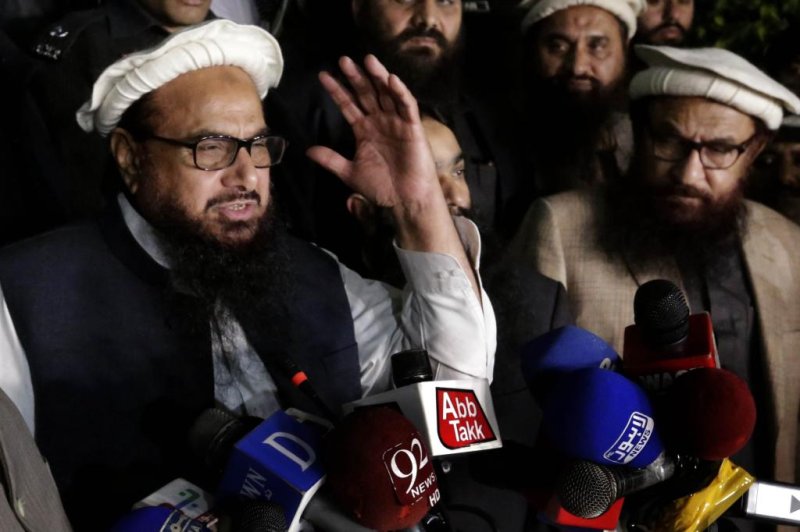Hafiz Saeed, at left, the founder of banned Islamic charity Jamaat-ud-Dawah, speaks to journalists after the Pakistani government placed him under house arrest, in Lahore, Pakistan, on January 30, 2017. Saeed is alleged to be the mastermind of coordinated attacks on the Indian city of Mumbai in 2008 that killed more than 160 people. Rahat Dar/EPA
Jan. 31 (UPI) -- The alleged mastermind behind a three-day terror spree in Mumbai nearly a decade ago was placed under house arrest Monday, with some suggesting the timing of his detention was linked to pressure from the United States and China, in addition to his links to terror.
Hafiz Saeed, leader of Jamaat-ud-Dawah, as well as four other members of the group were put under preventive custody Monday by Pakistani authorities, according to a government statement.
A spokesperson for the group said Saeed was put under house arrest because of requests from India, but others say the United States threatened sanctions on Pakistan if he was not locked down. Jamaat-ud-Dawah, often referred to as a charity, is thought to be a front for the militant jihadist group Lashkar-e-Tayyiba, of which Saeed is the founder.
Saeed was arrested not long after the 2008 attacks in Mumbai -- the lone surviving gunman involved in the attacks, which lasted three days and resulted in the death of 166 and injury of more than 200, was executed in 2012 -- but was released after six months, when he promptly formed another front group for Jamaat-ud-Dawah, officials say.
In 2012, Saeed denied involvement in any violent attacks, going so far as to offer aid to the United States after Superstorm Sandy ravaged the Northeast. India has long claimed to have evidence proving his involvement in the 2008 attacks, though.
At least one analyst, Amir Rana, director of the Islamabad-based Pak Institute for Peace Studies, said it's more likely Pakistan is looking to crack down on potential terror agents to prevent attacks instead of assuming they buckled under international pressure.
And with only speculation from Jamaat-ud-Dawah and Saeed about foreign actors motivating the arrests, but no statement from either the United States or India, Rana thinks they are not connected to the police action.
"This arrest was a long time coming," Rana told CNN. "This appears to be a genuine effort by Pakistan authorities to combat non-state actors within its borders."















